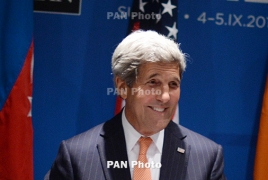
U.S. Secretary of State John Kerry on Monday, May 18, accused North Korea of a litany of crimes and atrocities while reassuring South Korea of America's "ironclad" security commitments, the Associated Press reports.
Kerry blamed North Korea for continuing to break promises, make threats and "show flagrant disregard for international law" by continuing to build its nuclear bomb and missile programs even as it oppressed its own people. He said North Korea's "horrific conduct" must be exposed and vowed to ratchet up pressure on Pyongyang to change its behavior, particularly since it has rebuffed repeated attempts to restart nuclear disarmament negotiations.
"They have grown the threat of their program and have acted with a kind of reckless abandon," Kerry said, referring to North Korea and its work on a growing arsenal of missiles and nuclear bombs that Pyongyang hopes will one day be able to reach the U.S. mainland.
His comments come less than a week after South Korea's spy agency said North Korean leader Kim Jong Un ordered his defense chief executed with an anti-aircraft gun for complaining about the young ruler, talking back to him and sleeping during a meeting Kim presided over.
Kerry called the reported killing just the latest in a series of "grotesque, grisly, horrendous, public displays of executions on a whim and fancy." He said that if such behavior continued, calls would grow in the international community for North Korea to be referred to the International Criminal Court.
South Korean Foreign Minister Yun Byung-se said "the severity of recent threats and provocations" made it essential to bolster the security relationship of the longtime allies.
Kerry also suggested the possibility of more sanctions against Pyongyang, already one of the most sanctioned countries in the world, over its "very dangerous course" of pursuing missiles and nuclear weapons. Washington and its partners are "talking about ways to increase the pressure and increase the potential of either sanctions or other means," Kerry said, according to the AP.
Kerry also expressed hope that the successful conclusion of a nuclear deal with Iran would send a positive message to North Korea to restart negotiations on its own atomic program.
North Korea conducted its first nuclear test in 2006 and is now believed to have at least 10 such weapons. It conducted its third nuclear test in February 2013, and U.S.-based experts forecast that it could increase its nuclear arsenal to between 20 and 100 weapons by 2020.
Kerry during his meetings also laid the groundwork for a June visit to Washington by South Korean President Park Geun-hye.
Later, in a speech at prestigious Korea University in Seoul, Kerry singled out Pyongyang and other, unnamed countries for repressing their citizens' use of the Internet. He used the speech to issue a broad call for open and secure cyber access as a global right.
Kerry said that authoritarian Pyongyang, with the lowest rate of access to the Web in the world, is the opposite of ultra-wired, democratic Seoul. Countries with poor Internet freedom, he said, often also had questionable human rights and a stifled economy without innovation or freely exchanged ideas.
Washington accuses Pyongyang of being behind last year's massive hack of Sony Pictures over a film that centered on the assassination of North Korean leader Kim Jong Un. Seoul also says Pyongyang has staged a series of hacks on major South Korean companies and government organizations. Pyongyang denies the hacking claims.
Kerry didn't mention China, but Washington recently voiced concern over a report that Beijing manipulated international Internet traffic intended for a major Chinese Web service company and used it for a cyberattack on U.S. sites.

